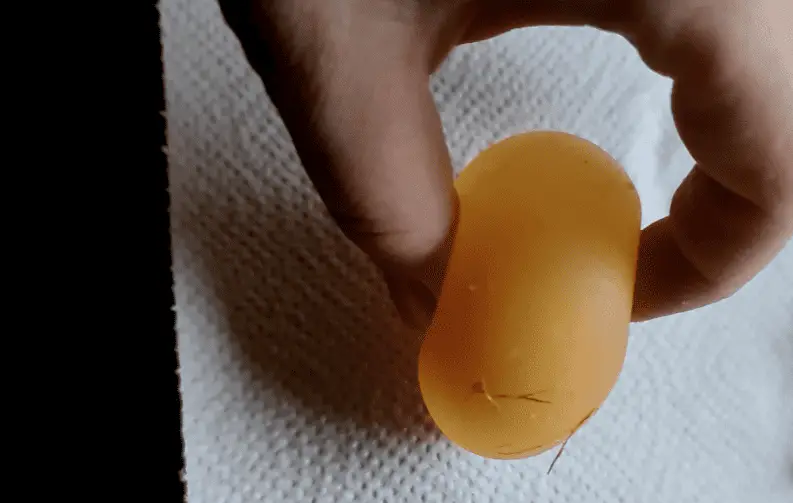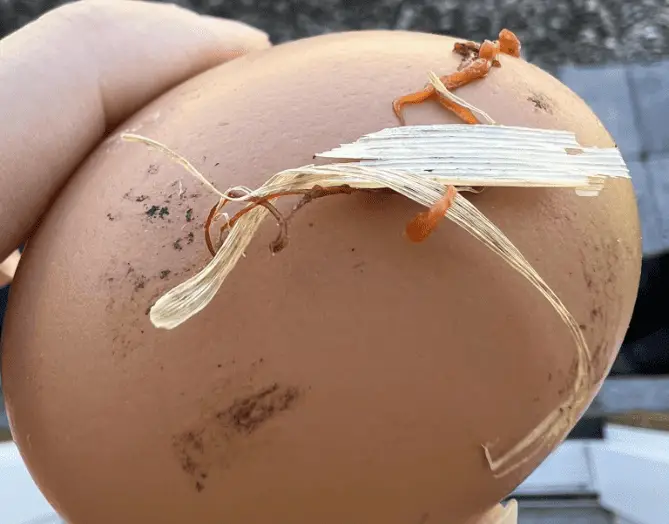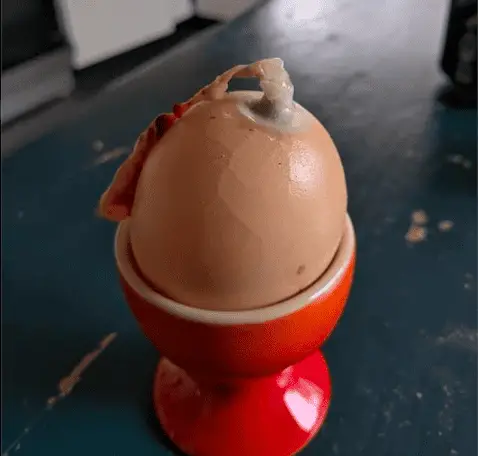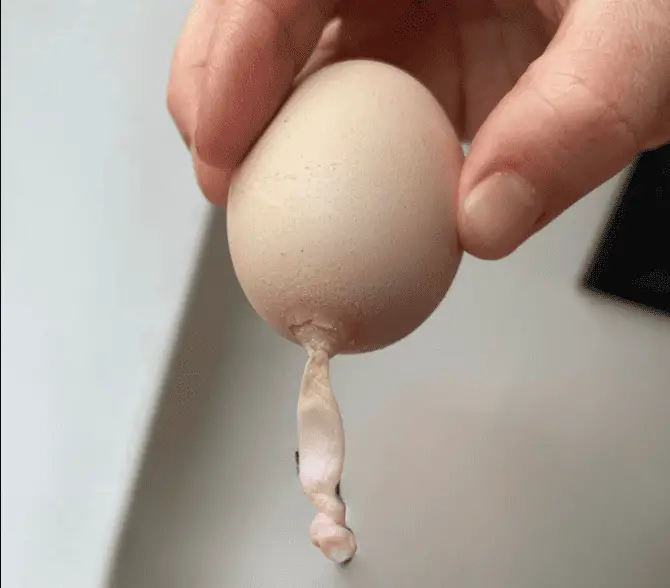Owning chickens for commercial or domestic purposes is fun. If you have been raising egg-laying chickens for several months or years, you have probably encountered different characteristics. The eggs of one hen may differ in colour, size, and shape from others. That is why backyard poultry raising is an exciting and fun activity where you can find lots of learning.
Have you ever encountered an egg with a tail at some point in your poultry-raising journey? Some of you probably had. What did you do about it? This post will help you better understand the possible reasons behind this and what solutions you can do when you find some of your chicken eggs have tails.
Expert Advice From Our Vet
If your chicken lays an egg with a tail-like appendage, it’s likely due to an abnormality during the egg formation process.
In most cases, such abnormalities are occasional and not a cause for major concern. However, if it happens frequently or if the hen shows signs of distress, health issues, or nutritional deficiencies.
Stress or Disturbance: Sudden stress or disturbances can disrupt the normal egg-laying process, leading to unusual egg shapes or appendages.
Age or Health of the Hen: Older or health-compromised hens are more prone to laying eggs with abnormalities.
Nutritional Deficiencies: Lack of essential nutrients, particularly calcium, can result in irregular egg formation.
Genetic Factors: Sometimes, genetic predispositions can cause hens to lay eggs with unusual characteristics.
Reproductive System Issues: Disorders or abnormalities in the hen’s reproductive system can lead to odd-shaped eggs or additional material being attached to the egg.
What Causes Eggs To Get Tails
Have you seen multiple eggs with tails produced by your hen? This might be alarming, especially for first-time encounters in this situation. In line with that, you may be asking what causes eggs to get tails.
This question has different answers. But, one of the common reasons your hens produce eggs with tail thingy is the food you give to them. You can give your chickens different foods, including crushed eggshells and oyster shells.
Some sources claimed that eating a lot of crushed eggshells could lead to a softer shell membrane, which creates a tail-like thing. On the other hand, this could also be because of the stress from the laying hen. Eggs with tails could be alarming, and they can also entail broken yolk.
In addition, not giving your hens enough calcium could also result in calcium deficiency, which causes soft-shelled eggs with a tail. Thus, you must provide your hens with enough calcium supplements. You can either give them oyster shell feeds.
If you have been feeding them with crushed eggshells, I highly recommend switching to oyster shells. In addition, make sure to provide them with enough food that their system can handle.
The chicken laid a soft egg with a tail
If your chicken laid a soft egg with a tail-like appendage, it could be due to a couple of specific reasons:
- Calcium Deficiency: The most common cause of soft-shelled eggs is a lack of calcium in the hen’s diet. Calcium is crucial for the proper formation of eggshells.
- Reproductive System Anomaly: The tail-like appendage could be a result of an irregularity in the hen’s reproductive system. Sometimes, during egg formation, extra calcium or other materials can be deposited, leading to unusual shapes or appendages.
- Stress: Stress factors like changes in environment, disturbances, or health issues can disrupt the normal egg-laying process, resulting in abnormal eggs.
- Age or Health Factors: Young hens just starting to lay or older hens may produce eggs with irregularities. Health issues can also contribute to this problem.
To address this, ensure your chicken has a balanced diet rich in calcium and consider providing a calm, stable environment.

Chicken Health Mastery
Click to See Our Complete Checklist for Ensuring a Healthy, Happy Flock
…have you missed anything?
Link To Antibiotics Or Immune Boosters?
If you found an egg with a tail in your coop, the first thing you may want to know is how to prevent it from happening again. Earlier, I have shared some of the common reasons why hens produce eggs with tails. In this section, I will help you choose the best immune boosters and antibiotics you could give to your egg-laying chickens.
Vitamin D
Hens with vitamin D deficiency are more likely to produce eggs with tails. Thus, giving your chicken this antibiotic or letting them outdoors in the morning could help them maintain balanced vitamin D in their system.
Immune Support Defense Booster Supplement
If you are looking for an all-in-one supplement to give to your coop, I highly recommend you to try this Immune Support Defense Booster Supplement. This is an all-in-one supplement designed to improve the immune system of your chickens. Chickens, especially hens, with a good immune system are more likely to create healthy eggs.
This immune booster is composed of 8 important ingredients, including Turmeric, Ginger, Echinacea, Elderberry, Quercetin, Vitamin C, and more. All these ingredients are packed in a single capsule to maintain your chicken’s healthy immune system.

Is The Hen Sick If She Lays an Egg With A Tail?
Knowing whether she is sick could be quite difficult if this is your first time raising chickens. This is because hens are often secretive. It would be easier for you to say if a hen is sick when you know the signs and symptoms of an ill chicken.
How would you know if the hen is sick if she lays an egg with a tail? Some of you may not know the answer. As mentioned, most hens can hide their health problems or illnesses. If she’s done laying her eggs, you may not even notice that she has health complications.
Laying eggs with tails can show issues with your hen’s health status. To give you an idea of how to know if a hen is sick, I have listed some of the common systems of an unhealthy hen:
- Tail pumping
- Abdominal straining
- Shaky wings
- Depressed or looks sick/stressed
- Fluffed up, sitting around, and often sluggish
- Does not show interest in drinking or eating

What To Do When You Find An Egg With A Tail In Your Coop?
When you find eggs with tails in your coop, the first thing you should do is check your chicken’s health status. Your hen may be egg-bound. An egg-bound chicken usually produces misshaped eggs or eggs with tails.
To help you out, here are the important things you must do when you find an egg with a tail in your coop:
Mix Epsom salts with warm water. The ratio is 1:1 (one cup of Epsom salt equals one gallon of water). Make sure that the mixture is deep enough to cover the bottom part of your hen. Before sinking your hen for a bath, it would be best to give her a calcium-rich supplement. If you don’t have an available calcium supplement, I recommend purchasing a powdered calcium supplement. This will allow the hen to swallow it easily.
After that, you can now give her a nice bath with the water you prepared earlier. Once her treatment is done, make sure to give her a gentle massage enough for oviduct stimulation. After that, dry her and put her in a dry crate. Make sure to give her enough food and water to consume. If needed, repeat the process at least four times over multiple hours.
Final Thoughts
If you found an egg with a tail thingy in your coop, you may be amazed. Some of you may take a few photos and share them with friends. But did you know that it could be a symptom of an egg-bounded hen? As mentioned, egg-bounded hens need immediate attention as it could complicate the problem.
Giving your hen a nice bath using a mixture of water and Epsom salt may solve the problem. On the other hand, if the tips I mentioned earlier didn’t work, it would be best to consult a professional to solve the problem immediately.


